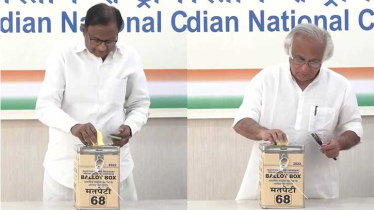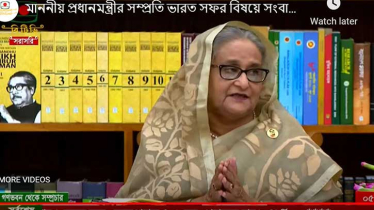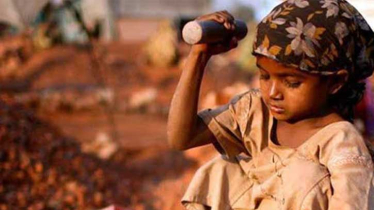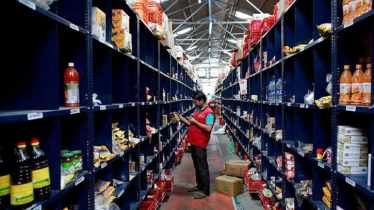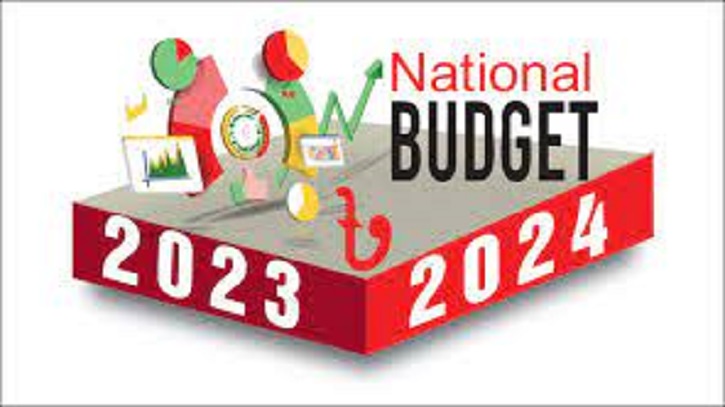
National Budget FY 2023-24
Finance Minister AHM Mustafa Kamal on Thursday placed the proposed national budget for FY2023-24 in Parliament with a deficit of Tk 2,61,785 crore with a focus on making a Smart Bangladesh and annual growth target of 7.5 percent.
In his 252-page budget speech, presented through audio-visual medium, the finance minister hoped to bring down the inflation rate to around 6 percent from the over existing 9 percent, a target economists described as ambitious.
The largest ever budget of the country stirred mixed reactions among the experts and stackholders.
The ruling Awami League and its affiliated organisations including student wing Chhatra League welcomed the proposed budget for FY2023-24 while BNP stated that the budget for the Fiscal Year 2023-24 was designed to benefit the patrons of the Awami League.
BNP leaders claimed that this budget does not reflect people's thoughts and opinions, nor is it time-befitting.
They further said the budget shows there is a major focus on infrastructure, whereas there isn't much work being done there. Awami League has burdened the country with foreign loans, adding that the main purpose of taking those was to create a model for "looting".
Awami League eyed that the proposed budget for the 2023-24 fiscal year has been prepared keeping in mind the common people.
"We have crossed the first step of the journey towards Sonar Bangla. It is a crisis recovery budget. This is the main point," Awami League General Secretary Obaidul Quader said during a media briefing on the proposed budget 2023-24 in the Jatiya Sangsad Bhaban area on Thursday (1 June).
he said, "Bangladesh is turning around. Commodity prices have now started falling in several areas. The budget was made in such a way that people's suffering will be eased. The price of goods will be within the purchasing power of people."
On the other hand, experts termed the proposed budget as as ambitious and unrealistic.
In the context of the ongoing crisis, the macroeconomic projections announced in the budget are illusionary and unattainable, they said.
CPD Executive Director Dr Fahmida Khatun said, “It is impossible to curb inflation and bridle the price hike with the measures that have been announced in the budget.”
In an immediate reaction to the proposed budget on Thursday, the think tank noted that the stable state of macroeconomics has been disrupted, with various pressures and challenges emerging.
Fahmida Khatun, executive director of the CPD, said one of the major issues addressed was inflationary pressure and rising commodity prices.
She stated that the proposed solutions presented in the budget for the upcoming fiscal year to curb inflation would not be effective.
Additionally, Fahmida Khatun pointed out concerns regarding the income tax system. While the budget increased the tax-free income threshold from Tk3 lakh to Tk3.5 lakh, it has imposed a mandatory income tax payment of a minimum of Tk2,000 for individuals seeking 38 government services, regardless of their financial income. The CPD criticised this decision as reckless and called for the rule requiring a minimum payment of Tk2,000 to be dropped.
Furthermore, the CPD expressed disappointment with the lack of emphasis on the reforms that were supposed to be implemented. Fahmida Khatun highlighted the fact that the budget did not provide details about the terms and conditions set by the International Monetary Fund (IMF), despite the IMF being mentioned three times in the budget document. The CPD noted that there were indications in the budget regarding targets that align with the IMF conditions.
Real Estate and Housing Association of Bangladesh (REHAB) authorities said an increase in income tax at source during land registration, and a new additional tax on various construction materials in the proposed budget will push the country's housing industry towards crisis.
President Alamgir Shamsul Alamin (Kajal) has said, "If the proposed budget is not revised, the prices of land and flats will increase in the future."
"The increased prices will question the slogan of housing for all and the dream of housing for many will become difficult," he said in an immediate budget reaction.
The proposed budget has imposed additional duties on cement, stone, tiles, lifts, ceramics, glass, switch sockets, cables, and kitchenware and realtors are the buyers of those construction materials. Finally, the price of these pricier products will fall on the flat buyer, he said.
He fears that if the prices of these products are not kept tolerable, there will be a crisis in the housing industry.
The REHAB President said due to an increase in the price of construction materials, and a decrease in the prices of new DAPs, the sales volume has already decreased. Besides, the sector has gradually come under serious threat due to various taxation and lack of government policy support in this emerging sector.
In this situation, it is impossible to overcome this crisis without the immediate support of the government, Alamgir Shamsul Alamin said.
"At this moment we fear that the increase in taxes on various products will have an adverse effect on the country's economy."
The proposed budget has set a target of 16% growth for tax collection in the upcoming 2023-24 fiscal year. This announcement has sparked concern and worries among businesses.
Because businesses are always made the prime targets for tax collection.
Businessmen said that tax collection as well as the size of the national budget must be increased to achieve the goals or visions of the government to reach a trillion-dollar economy.
To do so, structural reformation and capacity building of the National Board of Revenue (NBR) and other organisations responsible for tax collection are crucial, they said.
The Federation of Bangladesh Chambers of Commerce & Industries (FBCCI) thanked the finance minister as he proposed increasing the tax-free income threshold to Tk3.5 lakh from the existing Tk3 lakh for individual taxpayers.
It would be better if the limit was set to at least Tk4 lakh, considering the growing inflation rate in the last two years, said FBCCI President Md Jashim Uddin.
President of Dhaka Chamber of Commerce & Industry (DCCI) Barrister Md. Sameer Sattar has suggested that the tax free income ceiling for the individual taxpayers should have been increased further considering the current inflationary situation.
He also suggested the government to withdraw compulsory Taka 2,000 tax for a TIN holder to avail 44 government services. But, to fulfill the higher revenue target, Sameer said that it is important to implement automation in the taxation system and widening the tax net.
He also said that the budget is big indeed and there is a deficit of Taka 2,61,785 crore, but in order to implement such a large budget, partnership between NBR and private sector is more important to make it effective.
He hailed the decision of reducing documentation process at the time of corporate companies withholding tax return submission.
On the other hand, The Institute of Chartered Accountants of Bangladesh (ICAB) hailed the proposed national budget for fiscal year (2023-2024).
"We congratulate the government of Bangladesh led by Prime Minister Sheikh Hasina on the announcement of 16th consecutive budget for the FY 2023-24," said the ICAB in a statement.
The ICAB noted that despite Russia-Ukraine War, high inflation, rising commodity prices, dollar crisis, slowdown in business investment and employment, and other global uncertainties, government has taken a challenge of implementing development budget of Taka 277,582 crore which is very encouraging step to move forward for a developing country like ours.
Additional budget in the infrastructure sector is a commendable step taken by the government, it added.
It mentioned that expanding the tax net is badly needed under the current situation for enhancing the tax GDP ratio.
Some people named it the election year budget while others opined that it is not.
The government has expanded its expenditure target by a sizeable 15.3% given the global recessionary trend and the fact that this year's outlay has actually shrunk by 2.6%.
Development expenditure for next fiscal year has also been targeted 14.7% higher against this year's revised outlay which is a mere 0.7% more than the original target.
That is what an election year budget should look like when political expediency matters (One can always argue the increase is not much if adjusted for inflation).
You spend more to give more money to the people (party people included). When you have money, the public go happy (party people also turn euphoric as they have their electioneering bills to count).
But the buck stops just there when reality kicks in.
Experts questioned where will the money come for the spending spree? It seems the finance minister has gone on an overdrive to squeeze every possible penny out, just what the IMF had wanted in exchange of its budgetary support for the country's fledgling forex reserves. A 15.5% revenue growth target looks starkly different from this fiscal year's zero growth.
Not only the middle- and lower-class people will be hit, this will also have a cascading effect over consumer spending. Remember, Bangladesh's majority of the GDP is generated from consumption (74%). This means growth will take a direct hit for whatever it counts for.
So none of these unsavoury prospects go well for an election year.
And what if tax collection falters, as it has this year like many more preceding ones?
That will either mean to cut expenditure with less money exchanging hands, meaning an unhappy vote bank, if such banks exist in reality.
Or reaching out to the banks' vaults. Bank borrowing through treasury bills will increase. The resultant show will be an increase in treasury bill interest rates, creating more liability in terms of interest payment.
But that will surely hit investment at a time when entrepreneurs may already be feeling jittery over the prospect of an approaching election. Private investment curve is already heading south, and with further cuts employment and wages will be hit.
This will leave a bitter taste in the mouths of the voters. Bank borrowing will lead to higher inflation at a time when things are already costlier than before. So when faced with a prospect of low wage or unemployment, social unrest will brew.
On the other hand, the corporate Bangladesh will also feel the bitter pill of the double whammy of IMF's loan conditions and a deteriorating macroeconomic condition.
Moody's has already downgraded Bangladesh's credit rating to 'risky', immediately spinning them into a high cost regime. LC opening will be costlier and so will be foreign loans.
At the same time, Corporate Bangladesh will face higher-tax headwinds. Having to pay tax on interest payment is just one of them, but many rebates will be withdrawn and supplementary duty to be raised.
So the economic reality will force the finance minister to trim his wish for an election year budget.
//M//





